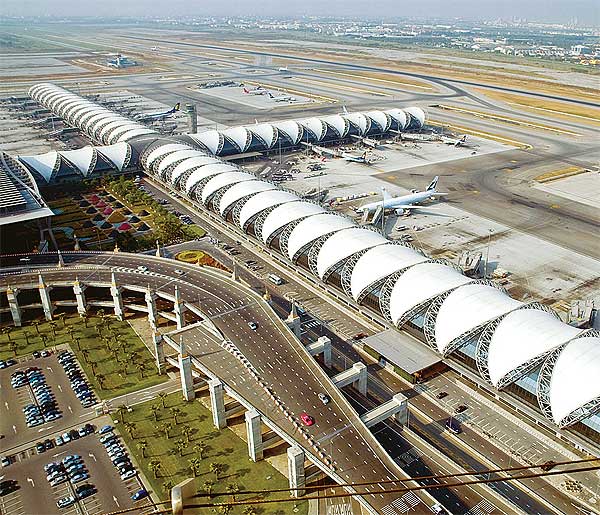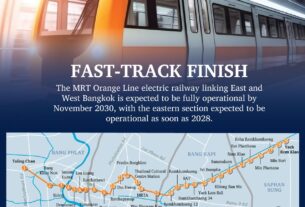Bangkok ‘s Suvarnabhumi Airport
B62bn to avoid overcrowding woes
The cabinet yesterday approved the long-delayed expansion of
But the expansion, which will lift the passenger handling capacity of

Based on current trends, Airports of Thailand Plc (AoT) expects Suvarnabhumi to reach its maximum capacity of 45 million passengers this year.
“It’s better late than never,” AoT president Serirat Prasutanond told the Bangkok Post, adding that the cabinet’s endorsement would help set the expansion in motion.
AoT made its first expansion proposal in late 2007, a year after Suvarnabhumi began operations. It subsequently underwent a series of reviews and revisions amid indecision by authorities and politicians.
The good news is that the airport expansion will not be subject to another hurdle at the National Environment Board (NEB).
The NEB, chaired by Prime Minister Abhisit Vejjajiva, resolved on Monday that the work involved in the extension of runways to 3,000 metres or more be included among 11 “harmful” activities that will require public hearings and environmental and health impact assessments. Proposals for such projects must be submitted for review by an independent body on health and the environment.
However, the Suvarnabhumi expansion approved by the cabinet yesterday does not involve runway construction even though earlier plans called for building a domestic passenger terminal and a third runway.
The expansion envisages the construction of a satellite passenger terminal to be located about 800 metres south of the existing terminal and linked by an underground automated people mover, a rail system that is used by leading airports around the world.
A concourse will accommodate 28 aircraft including A380 superjumbo jets, and there will also be new taxiways, buildings for airline offices and car parking, said AoT.
Having secured the green light from the cabinet, Mr Serirat said the state-controlled airport operating firm would soon start implementation of the project.
It will begin by hiring of a project management consultant to carry out work such as design and contractor selection.
Officials hope that construction can start in 2012 and be completed in 2015 or 2016.
But between now and then, AoT will have to deal with congestion at Suvarnabhumi by means of streamlining traffic flow and better management of aircraft time slots through shifting some arrivals and departures to non-peak periods.
“There is so much we can do with the streamlining,” said Mr Serirat, insisting that congestion problems could be avoided until the new capacity became available.
AoT plans to allocate 45.05 billion baht of its own funds to finance the expansion and secure another 17.45 billion baht from external sources such as loans or issuing debt instruments.
The aviation industry yesterday welcomed the project’s approval.
Expansion should have started two years ago, said Khongsak Hiranprueck, chairman of the Airline Operators Committee, a coalition of airline managers at Suvarnabhumi.
The industry including the International Air Transport Association (IATA) has advocated the expansion of Suvarnabhumi and maintaining its status as
Operators also support turning Don Mueang Airport, Bangkok’s former air hub, into an aircraft maintenance and parts production centre in addition to an airport serving non-connecting domestic flights along with chartered and private flights.
IATA director-general Giovanni Bisignani earlier asked Transport Minister Sohpon Zarum to intervene in plans to have two international airports in
Source: http://www.bangkokpost.com


